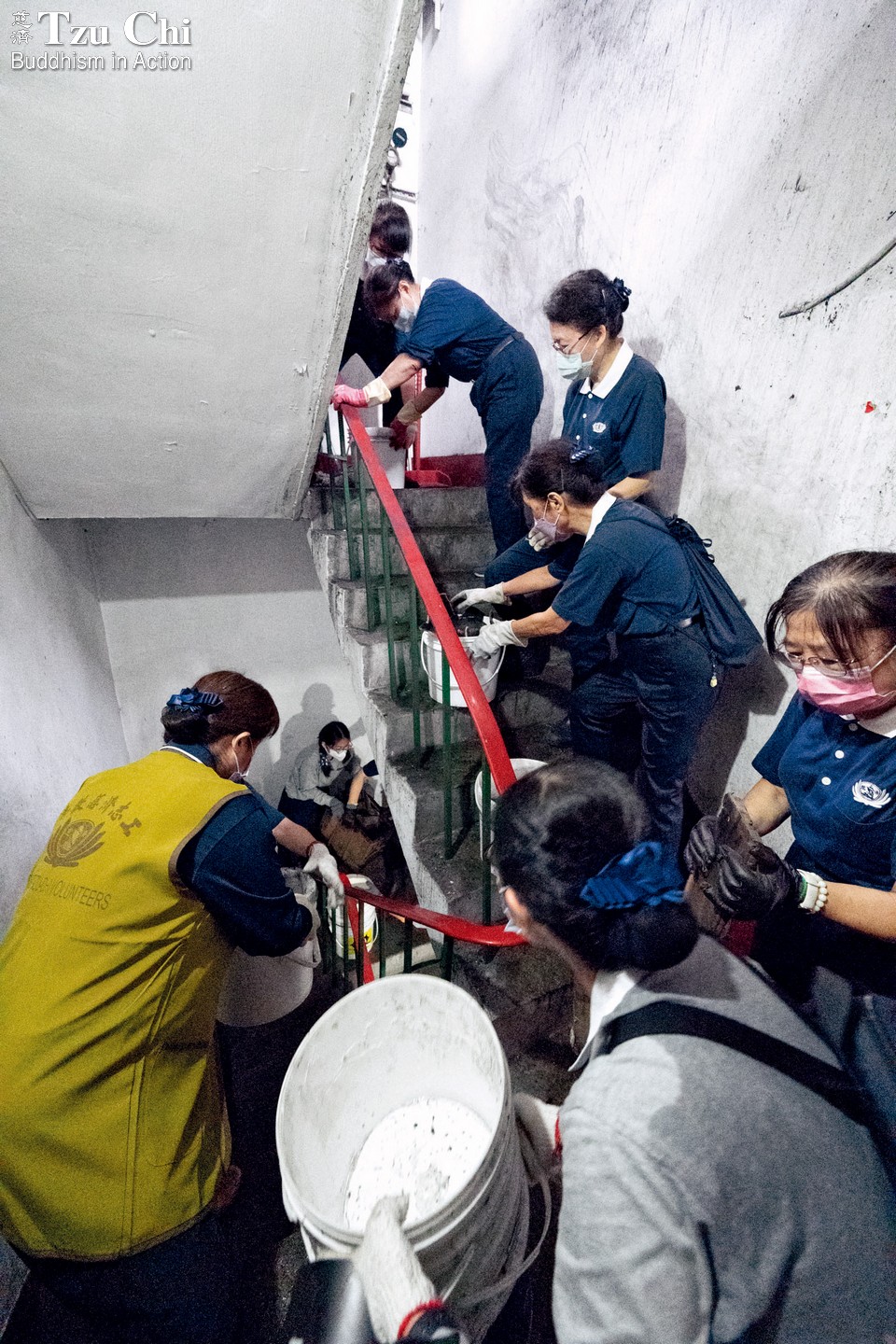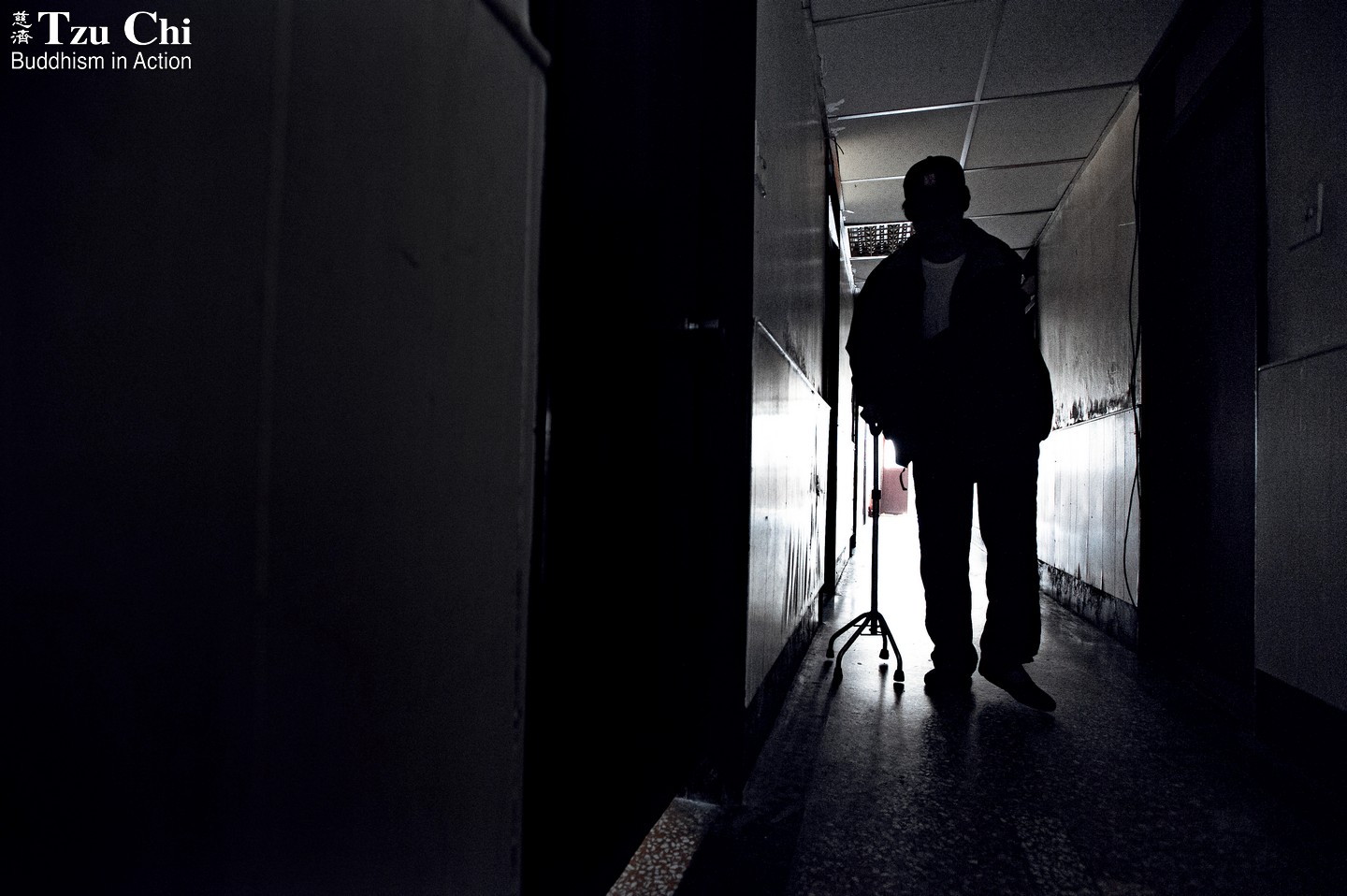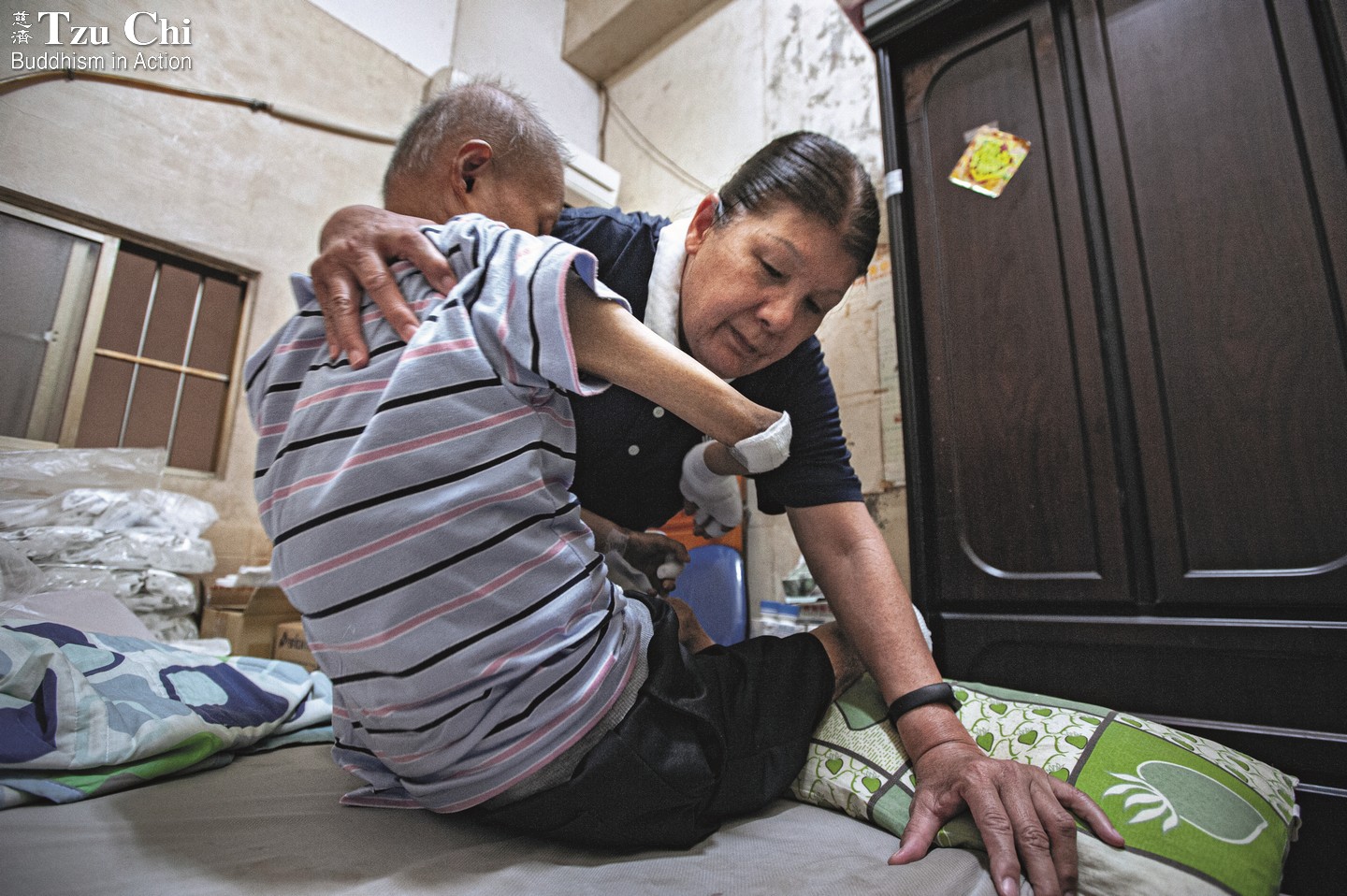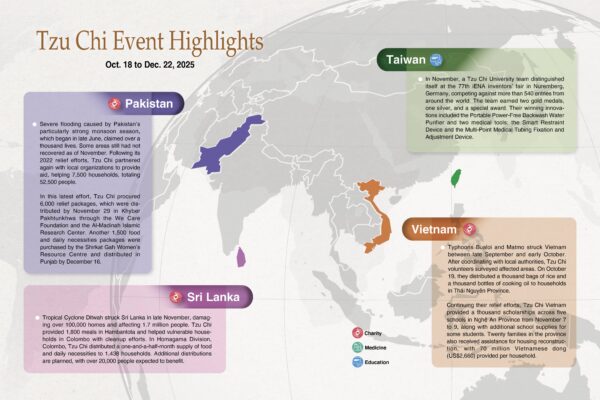By Yeh Tzu-hao
Translated by Wu Hsiao-ting
Ending poverty is the first of the United Nations Sustainable Development Goals. Addressing basic living needs is essential before tackling issues of fairness, justice, and social stability. Such a focus has also been central to Tzu Chi’s efforts.

Tzu Chi’s approach to reducing poverty involves providing tailored assistance. This photo shows volunteers removing debris and assisting with the aftermath of a fire at a care recipient’s home in Banqiao, northern Taiwan. Hsiao Yiu-hwa
One Saturday in May, Tzu Chi volunteers, wearing masks and gloves, lined up in the stairwell of an old apartment building in Banqiao, New Taipei City, northern Taiwan. Other volunteers, equipped with shovels and spades, scooped charred debris into buckets on the rooftop. Once filled, each bucket was passed from one person to another down the stairs. “Be careful, this one has nails!” they reminded each other, staying mindful of safety. “The entire rooftop home was destroyed by fire,” explained volunteer Li Jin-ping (李瑾萍). “We asked our volunteers to help with the cleanup today.”
A Tzu Chi home visit team had been assisting the family affected by the fire for over a year. The younger son, an elementary school student, had caught his teacher’s attention due to his frequently dirty clothes and a skin condition. After learning about the family’s situation, the teacher reported it to Tzu Chi. The boy’s parents, both in their 30s, had unstable jobs and relied on odd jobs for income. Their home was cramped and disorganized, and their two children often went without dinner until late. Additionally, the children struggled with their studies. After Tzu Chi volunteers and social workers assessed the family’s needs, regular home visits were arranged. Volunteers helped the elder son, in junior high school, with cleaning their home and began transporting the two children to and from Tzu Chi’s tutoring classes every Saturday. With Tzu Chi’s support, the family’s situation gradually improved. However, in late April this year, a fire broke out at their home. Fortunately, there were no casualties.
“This is the first time I’ve participated in such a cleanup effort,” said 23-year-old Ah Zhong, who is currently serving in the military. When Ah Zhong was in fifth grade, his father passed away from cancer, leaving the family without its main provider. With Ah Zhong and his younger brother still young, and their mother pregnant with their sister, the family fell into hardship. Thanks to help from the city government and charitable organizations like Tzu Chi, they managed to overcome those difficult times. Today, Ah Zhong was here to help and give back.
Also assisting with the cleanup was Cai Zheng Bao-zhu (蔡鄭寶珠), in her 60s. Over 20 years ago, her family became a low-income household after her husband fell ill and could no longer work. Tzu Chi helped get the family through their financial difficulties until they could stand on their feet again. She has since joined Tzu Chi as a volunteer, giving back to society.
Li Jin-ping found it gratifying to see past beneficiaries of the foundation’s assistance become fellow helpers, realizing that her and other volunteers’ efforts to support these families had not been in vain. “Every person we care for is unique,” she said. “We must be patient and treat them like family to assist them in regaining their stability.”

The causes of poverty vary across different age groups. Alleviating poverty requires thoughtful policy considerations and additional support from civil society organizations. Huang Xiao-zhe
Global Poverty Trends
In 2022, the World Bank adjusted the extreme poverty line to living on less than 2.15 U.S. dollars a day. While global trends show a continued decline in extreme poverty, over 700 million people still live below this threshold, with 60 percent residing in Sub-Saharan Africa.
The United Nations sets a lower extreme poverty line at living on less than 1.25 U.S. dollars a day. However, at the current rate of progress, achieving SDG 1, which aims to eradicate extreme poverty by 2030, remains unlikely.
Focusing on the whole family
“Ending poverty” is the first United Nations Sustainable Development Goal, which aims to eradicate extreme poverty worldwide by 2030. Extreme poverty is defined by the UN as living on less than 1.25 U.S. dollars per person per day. Although the global poverty rate continues to decline, in some low-income countries, fewer than eight percent of disadvantaged people receive government social welfare assistance.
The causes of poverty are diverse and complex, including structural problems in the broader environment, generational cycles, and incidents of accidents or illness. Despite Taiwan’s status as a developed nation, it had approximately 240,000 low-income and lower-middle-income households in 2023, according to the Ministry of Health and Welfare. This represents 540,000 people out of a population of 23 million. Additionally, quite a few families need assistance but do not qualify for government aid and must rely on support from private organizations.
The Tzu Chi Foundation has helped support more than 27,000 households annually in Taiwan over the past decade. Tzu Chi offers care to those struggling with poverty, illness, accidents, or the elderly living alone, from metropolitan Taipei to remote mountain and island regions. The foundation’s help includes monthly financial aid, problem-solving, and emotional support. Some families can quickly overcome their hardships with help from Tzu Chi, while others may require assistance for more than 10 or even 20 years.
Qiu Miao-ru (邱妙儒), from the Tzu Chi Department of Charity Mission Development, explained Tzu Chi’s approach to charity work in an interview marking the foundation’s 55th anniversary: “Compared with most non-profits or charitable groups, which often serve specific populations, Tzu Chi’s charity work is characterized by volunteer teams assisting people in disadvantaged situations without specific conditions.”
When volunteers visit a family, they evaluate the needs of the entire household, not just the reported individual. They assess the number of family members, their needs, and how best to help. Volunteers offer assistance based on the family’s educational, medical, or other needs, with at least one visit each month. Regular visits allow re-evaluation and adjustment of aid while building rapport and providing emotional support.
Lu Fang-chuan (呂芳川), director of the Tzu Chi Department of Charity Mission Development, elaborated: “Our care focuses on the whole person, the whole family, and the entire journey. We strive to find the most beneficial ways to assist every family member. With support and encouragement, individuals and families can transform their lives. Many examples within Tzu Chi illustrate this.”
He cited a case in Keelung, northern Taiwan, where both the husband and wife were deaf, mute, and physically disabled, making it difficult for them to earn a living. After receiving a report, Tzu Chi volunteers provided financial assistance and encouraged the couple to improve their home by cleaning and painting it. With their encouragement, the husband transitioned from a recipient of help to a contributor, using his carpentry skills to help repair the homes of other needy people and visiting Tzu Chi’s Neihu campus to help make the foundation’s signature eco-blankets.
Tzu Chi’s grassroots model of care encourages recipients to become self-sufficient and to help others, aligning with modern social work’s emphasis on empowerment. Individuals who are willing to stand up on their own have the best chance to escape poverty.

Tzu Chi volunteers regularly visit people in need, forming family-like relationships. Besides helping with practical issues, they inspire positive changes in care recipients’ mindsets through their companionship. Huang Xiao-zhe
Passive vs. proactive aid
“The ultimate goal of empowerment is to address poverty by fostering self-reliance through systemic and social reform,” explained social work scholar Wan Yu-wei (萬育維). He noted that the main problem with current social assistance in Taiwan is that both the government and private sectors primarily provide “passive assistance,” such as financial aid, but invest insufficiently in “proactive aid.” This results in long-term dependency, making it difficult for recipients to improve their circumstances.
Wan pointed out that proactive aid should focus on two key areas: first, creating job opportunities for those who can work, and second, helping people build their financial resources. For instance, if someone earns 10,000 NT dollars (US$330) from work but still struggles financially, the government could offer monetary incentives to encourage them to keep working and help them save, instead of just providing subsidies for survival.
He added that while providing monetary assistance alone may seem straightforward and convenient, it is less effective in the long run. Empowering aid recipients to transition from dependency to self-reliance is crucial to helping them maintain their dignity.
Tzu Chi invests considerable effort in proactive aid. In its philanthropic work in Nepal and India, for example, Tzu Chi not only provides material aid to the needy but also organizes vocational training courses and cash-for-work programs to help individuals become self-sufficient. By equipping people with new skills and providing employment opportunities, Tzu Chi’s initiatives aim to foster long-term resilience.
Encouraging education is another aspect of Tzu Chi’s proactive aid. Volunteers urge children from aid recipient families not to give up on education due to financial difficulties, encouraging them to progress steadily through their studies to transform their lives. Lu Fang-chuan mentioned that Tzu Chi assists over 27,000 families each year in Taiwan, including around 20,000 students from elementary school to university and graduate school. In addition to stabilizing their families’ lives, Tzu Chi provides educational subsidies, scholarships, and tutoring programs to ensure that these students have the resources and support needed to succeed in their studies. By investing in education, Tzu Chi helps to break the cycle of poverty and opens up new opportunities for future generations.
Many underprivileged youths who have received Tzu Chi’s care in Taiwan have excelled, overcoming financial barriers to enter top universities and taking the first step toward transforming their lives. Among the 56 winners of the 2024 Presidential Education Award, which celebrates students who manage to thrive and shine despite facing significant challenges, 8 are children from Tzu Chi’s care recipient families.
In Tzu Chi, proactive aid has another layer of meaning. “To be honest, among those we care for, some are unable to earn ‘worldly wealth’ due to physical limitations or age,” said senior volunteer Lai Xiu-luan (賴秀鸞), who lives in southern Taiwan. “They want to work but can’t find anyone to hire them. However, they can earn ‘spiritual wealth,’ for example, by volunteering at Tzu Chi recycling stations.”
Lai explained that encouraging those who receive help to step out and do good deeds is not easy and requires patience and persistent encouragement. However, once they are willing to participate, their mental state and overall health improve.
Tzu Chi has set up recycling stations, assistive device outlets, and community care centers in most townships across Taiwan. Volunteers encourage Tzu Chi care recipients to contribute to society by volunteering. While there may be no monetary compensation, they contribute to society and the environment all the same, no less than those in paid positions. Echoing social work scholar Wan Yu-wei, this approach enhances aid recipients’ dignity as human beings.
Complex challenges
Reflecting on 18 years of experience in home visits and care for the needy, volunteer Lai Xiu-luan noted that while Tzu Chi’s community resources and support in Taiwan have expanded—such as through the establishment of assistive device outlets and home repair teams, which enable the foundation to offer more tangible assistance—the challenges for providing care have also become more numerous and complex. Changes in the socioeconomic environment, population structure, and societal values have contributed to these growing difficulties.
For instance, many young people are not good at managing their finances and lack savings. When unexpected events or serious illnesses occur, they struggle to make ends meet, making them candidates for emergency assistance. Additionally, a notable number of young and middle-aged individuals struggle with drug addiction, which places a heavy burden on their families. “Situations involving mental or psychological issues, dementia, elderly individuals living alone, or elderly couples relying on each other have also become more common,” Lai explained. “How do we provide care for these individuals? How do we support their families?”
The diversity and complexity of cases handled by Tzu Chi in Taiwan today differ significantly from a decade ago, with recent shifts being even more pronounced. Psychological support and companionship have become even more crucial, sometimes surpassing the importance of financial assistance. Lai affirmed, “To provide better care, we need to acquire more relevant knowledge and participate in more training courses to enhance our skills and effectively support individuals and families.”
For example, volunteers now encounter cases of “hermit-like” individuals who rarely leave their homes, highlighting the fact that modern social issues extend beyond economic factors to include significant psychological support needs. According to recent statistics from the Tzu Chi Foundation, the number of cases receiving emotional support from Tzu Chi in Taiwan now surpasses those receiving long-term financial aid.
Volunteers implement Tzu Chi’s model of care for disadvantaged families in their respective countries, providing not only poverty relief but also diverse forms of assistance. Photo 1 shows members of the Tzu Chi International Medical Association arriving to provide health education at a household in a community of stateless people in Sabah, Malaysia (photo by Lim Su Nguan).
Volunteers have also established learning centers for stateless children in Sabah to break the cycle of hardship. Photo 2 captures volunteers visiting the home of a child attending one of these learning centers to offer care and encouragement (photo by Lin Jia-ru).
Transformative charity
With regular visits to needy families and highly flexible care programs, Tzu Chi’s charitable mission aims to support families until they achieve self-sufficiency. Founded in Taiwan in 1966 by Dharma Master Cheng Yen, Tzu Chi has been working to eliminate poverty since Taiwan’s economically challenging times, before its economic takeoff.
Regarding Tzu Chi’s charity work, the Master has articulated a path that transcends social classes. She believes in inspiring the wealthy to use their resources to help the disadvantaged. By doing so, they not only add to the welfare of the world but also create blessings for themselves. At the same time, she encourages the impoverished to do what they can to help others. Everyone has the capacity to give. “Even if their contribution is as little as a drop of water,” the Master said, “it becomes part of the whole in a large pot, benefiting many.” Everyone becomes rich spiritually through giving, regardless of their financial status.
For nearly six decades, Tzu Chi volunteers have implemented this philosophy and approach worldwide. In Africa, local volunteers, despite their own poverty, visit and assist those even more in need. Volunteers from Malaysia and Singapore leave their businesses and homes to take turns staying in Nepal and India, helping the local impoverished populations. In the sandy deserts of the Middle East, Jordanian volunteers regularly visit refugee settlements and destitute communities, providing medical, educational, and other assistance.
Poverty will likely exist as long as human society continues to function. However, Tzu Chi’s charitable experience shows that while poverty may not disappear, the associated issues of material scarcity, emotional despondency, and loss of dignity can be overcome.
To eliminate poverty, we need more than just money, food, and medicine. We also need to give love, respect, and encouragement. Tzu Chi believes there is love in everyone’s heart and in the ability of everyone to give. Those receiving help, even if they are lacking in material things, can find their own value and achieve spiritual fulfillment by giving to others.
“Master Cheng Yen hopes that both the giver and the receiver can experience compassion and gratitude. This is crucial and embodies the spirit of our charity work,” concluded Yen Po-wen, CEO of the Tzu Chi charity mission.



